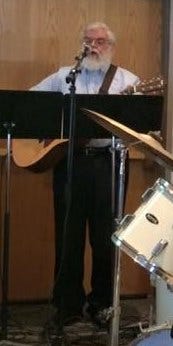Almost every Saturday I join fellow pro-lifers outside the local headquarters of Planned Parenthood. We pray, sing, and hold signs saying thing like "LOVE WILL END ABORTION" and "WE WILL HELP YOU".
Most often we will have with us a person with packets of information about resources to help pregnant women. That person will call out to any woman heading for Planned Parenthood, asking if the woman is willing to talk, and offering a packet. If the woman says no, or just keeps walking, the pro-lifer will offer them a blessing, then stop.
There are always police there. Most interactions with them are friendly. We say hello. We say we hope they will stay safe.
Sometimes, the officers are less friendly. They tell us there is a court order keeping us a certain distance from Planned Parenthood. We politely cite the case that modified that injunction, saying it only applies to certain named individuals, and that most of us are not those people Those who are named do indeed obey it. Usually, that is enough. But sometimes they say they need to check, and tell to move further away. We obey their orders without yelling, spitting, insulting, etc.
Every Saturday, we face some kind of opposition. Most often, it is people driving by or walking by and yelling at us, insulting us, calling us names, swearing at us, giving us the finger, and so on. Although it has not happened to me, sometimes those opposing us throw objects at pro-lifers - everything from eggs to full cans of soda. Sometimes the opponents even approach us, get in our faces and try to provoke a reaction. We remain polite, and do not respond violently.
But the potential for more serious violence is also there. Indeed, one of our local pro-life centers was firebombed.
I go there knowing that there is always a chance I might face violence. It is a risk I am willing to take because I believe in the cause.
That acceptance is basic to being involved in non-violent protesting. Being willing to be the object of violence, and not to respond in kind. To possibly face arrest. Certainly some pro-lifers in other cities are arrested. Locally, one of my friends, a priest, did spend time in jail. This willingness to accept the consequences of our protests is something we saw in the Civil Rights movement of the 1960's. It's a tactic promoted by Mahatma Gandhi.
I'm a veteran of not only pro-life protests. I've protested war, nuclear weapons, the death penalty, etc. Always non-violently. Always with the awareness that I might face violence, perhaps leading to physical harm.
Which brings me to Alex Pretti.
No, unlike certain politicians, pundits, and talking heads, I am not about to call anyone names or place blame. I was not there. I did not talk to witnesses. I have not seen all the available videos. I wait for the investigation to be complete. To offer an opinion without all the evidence - as those politicians, pundits, talking heads are doing - would be premature and irresponsible.
Nor am I defending Mr. Pretti's actions at this and previous protests. I do say his death was a tragedy, as I say of all such violent deaths.
But, I understand his willingness to stand up for a cause, despite the risks.
Sadly, the consequences of his willingness was his death.
Pax et bonum






